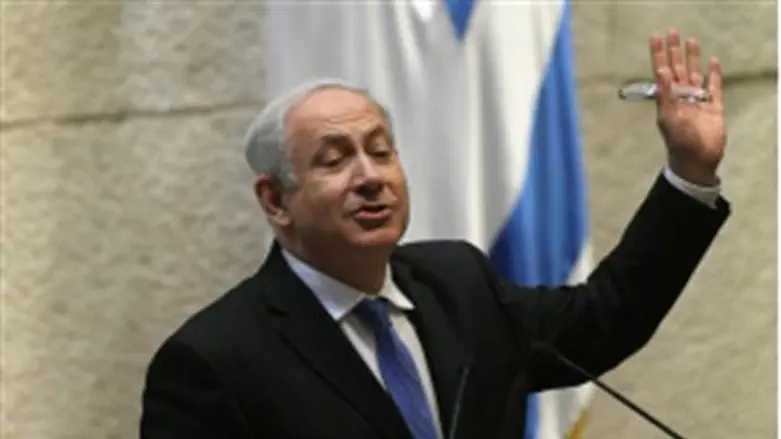
Even after Netanyahu’s offer of land-for-talks, Abbas still refuses to budge, demanding a total construction freeze before sitting down to talk.
Prime Minister Binyamin Netanyahu actually offered to give land over to Palestinian Authority-control, in exchange for the PA’s consent to sit down to direct talks with Israel – but PA chairman Mahmoud Abbas has said that even that is not enough. Abbas says he will refuse to sit down and talk with Israel until the latter agrees to stop all construction in Judea and Samaria, and even in eastern Jerusalem.
Netanyahu made the offer at his most recent appearance at the Knesset Foreign Affairs and Defense Committee last week. He said that he would be willing to transfer to Area B status – i.e., under Israeli military control and PA administrative control – a strip of land north of Ramallah, in the Binyamin region, so that the new PA city of Rawabi could have easy access to Ramallah.
The transfer of the land for the highway would separate western and eastern Binyamin, effectively isolating the Jewish communities of Ateret and N’vei Tzuf.
Netanyahu said he would give the land to the PA “in the opening stage of the direct talks.”
Abbas did not relate to this offer, but has stood his ground nonetheless, refusing to enter into direct talks with Israel until all construction is stopped in Judea and Samaria. This, despite pressure from the United States and Saudi Arabia to agree to direct talks. Even the Arab League has agreed to the idea, on condition that there be a definitive time frame to end the conflict and a monitoring unit to ensure that conditions are being met.
Netanyahu’s offer has many Israelis up in arms. The Regavim land organization said it would appeal to the Supreme Court, calling the apparent concession "an outrageous decision, opposed to Israeli interests and security, executed without authorization.” Regavim says that such a decision cannot be implemented without the Knesset’s approval.
The Binyamin Residents Council accused Netanyahu of “trampling the Jewish settlement enterprise.” Its statement noted, “First there was the construction freeze in Judea and Samaria, then the brutal destruction of homes such as the one Monday morning, and now the transfer of control of Jewish land to the Arabs. Netanyahu has lost his sense of justice and morality, and is essentially encouraging the Arabs to continue on the path of terror and violence, which only grants them diplomatic gains at the expense of Jews."
Eldad Objects
MK Aryeh Eldad (National Union) wrote in the weekly B’Sheva as follows: “Even to someone who wants to see another Arab city in the heart of the Land, it is clear that there are other alternatives. The PA can pave a road that passes through Areas A and B [i.e., area that is already under its control], but they of course want the shortest route, and preferably at our expense. They have certainly not forgotten that it was Netanyahu who, in his previous term, gave them 13 percent of the territory, including Hevron. So if someone wants to give, why not take?”
“Even Barak and Olmert, who were willing to give the Arabs 97 percent of Judea and Samaria and half of Jeruslem, never stooped to such a low level. They did not even consider giving away land simply as a gesture for the PA’s consent to talk!”
“Only a seemingly ‘nationalist’ Prime Minister is willing to pay with the Land of Israel for consent to direct negotiations,” sums up Eldad.
HaEtzni's Five Points
Land of Israel activist Boaz HaEtzni of Kiryat Arba notes that this apparent concession follows Netanyahu’s turnabout last year in which he abruptly came out in favor of a Palestinian state (albeit demilitarized), a de-facto building freeze in many parts of Jerusalem, and no response to the “economic war” declared by the PA against Israel in the form of a boycott of Jewish goods from Judea and Samaria.
“There is no real need to transfer territory simply to pave a road,” HaEtzni writes. “The Arabs can travel on a road in Israeli-controlled territory just as they do on many other roads in Judea and Samaria. This is simply a political demand, designed to advance the establishment of a Palestinian state…”
HaEtzni lists the reasons why such a concession must not be considered, including the following:
- The construction freeze put the brakes on the Jewish hold in Judea and Samaria – but transferring territory to the PA means giving the PA a politically-significant hold on the land, at the expense of the Jewish presence.
- This would take Israel back to the path of withdrawals, which had stopped [except for the Disengagement plan] in the past 10 years.
- This would be a withdrawal carried out not in the framework of a signed agreement, but merely a gesture for the simple willingness to talk – as if negotiations are only an Israeli interest!
- It is particularly grave in that it comes five years after the Disengagement, after nearly all of Israeli society, including Prime Minister Binyamin Netanyahu, has learned the lesson that we must not withdraw without receiving something in return.
- This would be a violation of previous Cabinet decisions from the first Netanyahu government. In January 1998, the Cabinet investigated the matter thoroughly and found that any withdrawal from more than 9 percent of the territory would be dangerous and should not be done. This decision was made before the years of terrorism beginning in 2000 and before Hamas ascended to power. Ultimately, Netanyahu agreed to give over 13 percent during the Wye Plantation talks. To give over even another meter now would be a continuing violation of the letter and spirit of the Cabinet decisions.